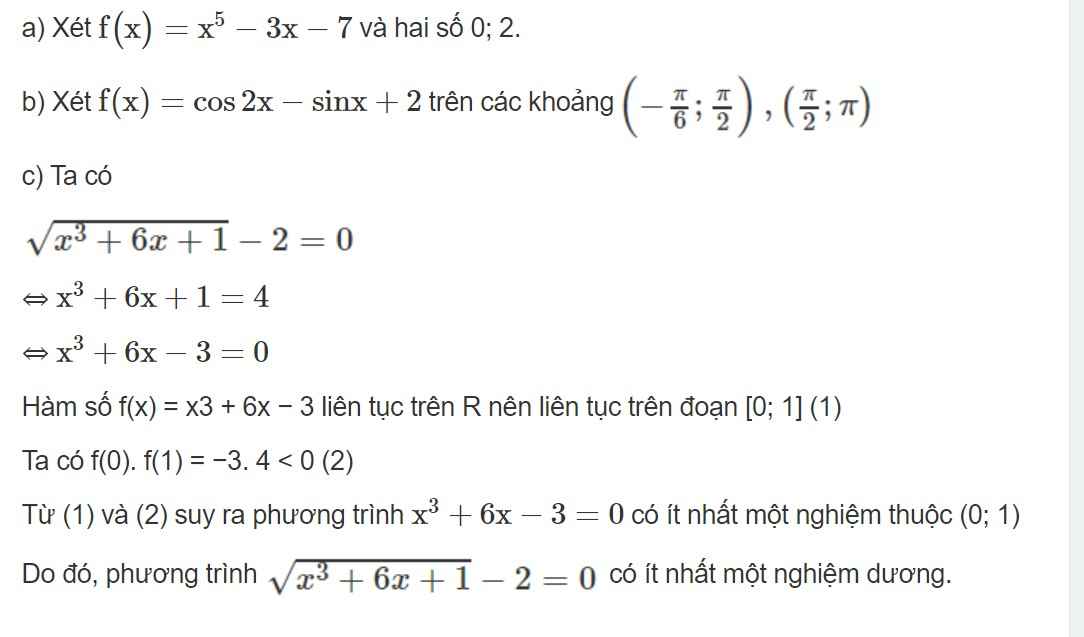Hãy nhập câu hỏi của bạn vào đây, nếu là tài khoản VIP, bạn sẽ được ưu tiên trả lời.

2, sin4x+cos5=0 <=> cos5x=cos\(\left(\frac{\pi}{2}+4x\right)\Leftrightarrow\orbr{\begin{cases}x=\frac{\pi}{2}+k2\pi\\x=-\frac{\pi}{18}+\frac{k2\pi}{9}\end{cases}\left(k\inℤ\right)}\)
ta có \(2\pi>0\Leftrightarrow k< >\frac{1}{4}\)do k nguyên nên nghiệm dương nhỏ nhất trong họ nghiệm \(\frac{\pi}{2}\)khi k=0
\(-\frac{\pi}{18}+\frac{k2\pi}{9}>0\Leftrightarrow k>\frac{1}{4}\)do k nguyên nên nghiệm dương nhỏ nhất trong họ nghiệm \(-\frac{\pi}{18}-\frac{k2\pi}{9}\)là \(\frac{\pi}{6}\)khi k=1
vậy nghiệm dương nhỏ nhất của phương trình là \(\frac{\pi}{6}\)
\(\frac{\pi}{2}+k2\pi< 0\Leftrightarrow k< -\frac{1}{4}\)do k nguyên nên nghiệm âm lớn nhất trong họ nghiệm \(\frac{\pi}{2}+k2\pi\)là \(-\frac{3\pi}{2}\)khi k=-1
\(-\frac{\pi}{18}+\frac{k2\pi}{9}< 0\Leftrightarrow k< \frac{1}{4}\)do k nguyên nên nghiệm âm lớn nhất trong họ nghiệm \(-\frac{\pi}{18}+\frac{k2\pi}{9}\)là \(-\frac{\pi}{18}\)khi k=0
vậy nghiệm âm lớn nhất của phương trình là \(-\frac{\pi}{18}\)

b/
\(cos4x=\frac{1}{2}+\frac{1}{2}cos6x\)
\(\Leftrightarrow2\left(2cos^22x-1\right)=1+4cos^32x-3cos2x\)
\(\Leftrightarrow4cos^32x-4cos^22x-3cos2x+3=0\)
\(\Leftrightarrow\left(cos2x-1\right)\left(4cos^22x-3\right)=0\)
\(\Leftrightarrow\left(cos2x-1\right)\left(2cos4x-1\right)=0\)
\(\Leftrightarrow\left[{}\begin{matrix}cos2x=1\\cos4x=\frac{1}{2}\end{matrix}\right.\)
\(\Leftrightarrow\left[{}\begin{matrix}x=k\pi\\x=\frac{\pi}{12}+\frac{k\pi}{2}\\x=-\frac{\pi}{12}+\frac{k\pi}{2}\end{matrix}\right.\)
\(\Rightarrow x=\left\{0;-\frac{11\pi}{12};-\frac{5\pi}{12};\frac{\pi}{12};\frac{7\pi}{12};-\frac{7\pi}{12};-\frac{\pi}{12};\frac{5\pi}{12};\frac{11\pi}{12}\right\}\)
Bạn tự cộng lại
c/
\(\Leftrightarrow2cos^2x-1-\left(2m+1\right)cosx+m+1=0\)
\(\Leftrightarrow2cos^2x-\left(2m+1\right)cosx+m=0\)
\(\Leftrightarrow2cos^2x-cosx-2mcosx+m=0\)
\(\Leftrightarrow cosx\left(2cosx-1\right)-m\left(2cosx-1\right)=0\)
\(\Leftrightarrow\left(cosx-m\right)\left(2cosx-1\right)=0\)
\(\Leftrightarrow\left[{}\begin{matrix}cosx=\frac{1}{2}\\cosx=m\end{matrix}\right.\)
Do \(cosx=\frac{1}{2}\) vô nghiệm trên \(\left(\frac{\pi}{2};\frac{3\pi}{2}\right)\) nên pt có nghiệm khi và chỉ khi \(cosx=m\) có nghiệm trên khoảng đã cho
Mà \(-1< cosx< 0\Rightarrow-1< m< 0\)

1.
ĐKXĐ: ...
\(3cotx=-\sqrt{3}\Leftrightarrow cotx=-\frac{1}{\sqrt{3}}\)
\(\Rightarrow x=-\frac{\pi}{3}+k\pi\)
2.
\(\Leftrightarrow2x+\frac{\pi}{6}=\frac{\pi}{3}+k\pi\)
\(\Leftrightarrow x=\frac{\pi}{12}+\frac{k\pi}{2}\)
3.
\(\Leftrightarrow\left[{}\begin{matrix}x+\frac{\pi}{6}=\frac{2\pi}{3}+k2\pi\\x+\frac{\pi}{6}=-\frac{2\pi}{3}+k2\pi\end{matrix}\right.\)
\(\Rightarrow\left[{}\begin{matrix}x=\frac{\pi}{2}+k2\pi\\x=-\frac{5\pi}{6}+k2\pi\end{matrix}\right.\)
4.
\(\Leftrightarrow sin\left(x+\frac{\pi}{4}\right)=-\frac{\sqrt{2}}{2}\)
\(\Leftrightarrow\left[{}\begin{matrix}x+\frac{\pi}{4}=-\frac{\pi}{4}+k2\pi\\x+\frac{\pi}{4}=\frac{5\pi}{4}+k2\pi\end{matrix}\right.\)
\(\Leftrightarrow\left[{}\begin{matrix}x=-\frac{\pi}{2}+k2\pi\\x=\pi+k2\pi\end{matrix}\right.\)

Đáp án D.